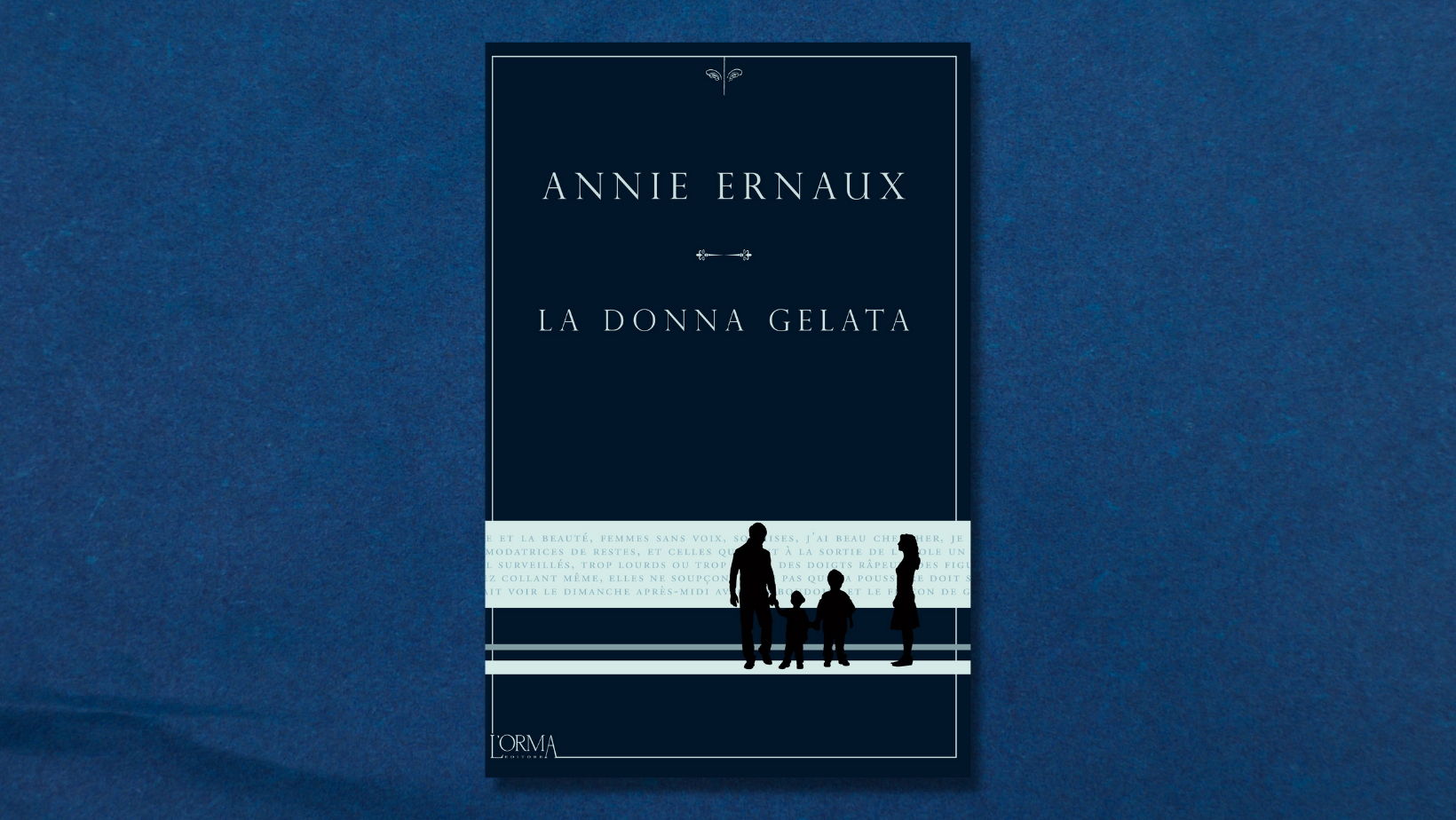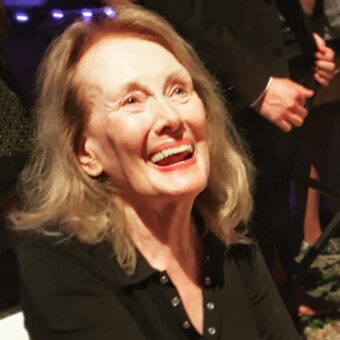
A frozen woman by Annie Ernaux. A review by Claudia Mazzilli
The French writer Annie Ernaux boldly talks about women “frozen” by the obligations of motherhood.

Annie Ernaux
In her novels, Annie Ernaux always tells the same story. Each time, however, the writer pulls out a single thread from the narrative skein of her memories, a thread that binds her experience to a collective narration: the death of her father; the death of her mother; her first loves; a clandestine abortion; a little sister who died before her birth; the school; the public exams to become a teacher; a summer vacation; a quarrel between her parents. From a single episode a full story unfolds with exact precision, a thread that expands in a spiral and encloses in itself a cross-section of French society between the rural suburbs and the big city, from 1940 to today, along a life that goes through all the stages of a woman’s emancipation, balancing out between moments of progress and others of regression, because the thread sometimes gets tangled. Nothing is linear in Annie Ernaux’s effort to reclaim her life in the most radical way.
A frozen woman (Four Walls Eight Windows, New York 1995; translated by Linda Coverdale) is the novel in which the myth of motherhood is deconstructed. Born and raised in a small provincial village by blue-collar workers who leave the factory to open their own grocery store, Annie Ernaux does not experience at home the difference between male and female duties: both parents work at the grocery store; the father is the one who often cooks; the dust on the furniture remains where it is, in her home as well as in that of other relatives. School, on the other hand, is the place where Annie discovers the rules of patriarchy, also through socializing with other upper-class girls, whose mothers, at home, are dedicated – like fairies in fairy tales – to tasks quite distinct from those of men, and satisfyingly so (!). In comparison, Annie’s mom and aunts appear to be rustic, hybrid, mannish creatures. Then, among her university friends, Annie finds a boyfriend (from a more “middle-class and urban” family) and gets married; the division of chores between husband and wife seems fair:
Where’s the slavery I’d read so much about?… The Second Sex? Completely off base! (p. 137)
“The touching image of a young, modern, intellectual couple”, (p. 137) however, is crumpled: the irreparable tear is the birth of the first child, who pushes underground any illusion of emancipation and equality. Not so much because of him, her husband, but because of the pressure coming from the outside world directly into the intimacy of the house (furnished with great taste and care, tenaciously protected from the external world): the two newlyweds are still looking for a steady job, and the man will find it first. A socio-biological destiny inevitably binds Annie to the primary and all-encompassing duty of caring for her child: the even distribution of domestic chores falls through because her husband spends little time at home.
Mothering, they say, the landlady and my mother-in-law. That’s sweet; mothering, smile for mama, kitchy-coo, nighty-night. Too good to be true. I discover the joys of a day divided up by six diaper changes and six bottles; I try but it isn’t enough, my milk dries up in ten days. At five in the morning, I stare fixedly at the bottle heating in the double boiler. Glass-eyed. That people are leaving for work at the same hour, that the garbagemen are out there tipping the cans into the truck doesn’t console me; I feel as if we were in different dimensions. Food and shit, food and shit, relentlessly. Obsessed with germs, and gas. Idealize the humble chore, of course, the choice tasks lovingly carried out, etc., the transfiguration of shit. (pp. 150-151)
The words “house,” “food,” “education,” “work” no longer have the same meaning for him and for me. (…) The bare minimum, and nothing more. I’m not going to let myself be had. Plonk the bowls into the dishpan, wipe off the table, draw up the bedcovers, feed Kiddo, bathe him. No sweeping, absolutely no dusting—the last vestige, perhaps, of my reading of The Second Sex, the story of an inept and hopeless battle against dust. (pp. 157-158)
But…:
This is now: the beauty of our surroundings must be maintained. Harmony must be preserved. Don’t I have a fancy new vacuum cleaner with a raft of gadgets to suck up even invisible dirt specks?. I’ll make an effort—so what if getting the dingus out of the closet and switching around all its silly attachments and stuffing it back where it came from takes three times as long as a brisk pass with a broom. (…) Laundry to be sorted, a shirt button to sew back on, an appointment at the pediatrician’s, we’re out of sugar. The inventory that has never moved or amused anyone. Sisyphus and that rolls endlessly back up the hill—at least it’s dramatic, a man on a mountain outlined against the horizon, whereas a woman in her kitchen tossing some butter into a frying pan three hundred and sixty-five times a year, that’s neither heroic nor absurd, that’s just life. (pp. 163-164)
And he:
In the evening, when he picks up a beaming Kiddo – washed, fed, and freshly diapered for the night – it’s as though I’ve lived the entire day for these ten minutes: the presentation of the child to the father. (p. 170)
Annie resumes studying for the teaching exams which will return her to the outside world. A study concentrated during the baby’s two-hour afternoon nap, in the hope that he won’t wake up. Until the balance between husband and wife is broken. But then it readjusts:
The pleasure of being able to scream myself crazy without him putting me down with a superior smile, no big words if you please. But the time will come when I won’t allow myself to pitch a fit, “because of the child,” aren’t you ashamed, in front of him, dignity, in other words, submission… A father with a firm hand and a mother who keeps mum: very good for children’s nerves. (p. 176)
And when he asks her if he can go to the cinema alone, for Bergman’s latest film:
“Would it bother you if I went to see it this afternoon?” “What good is it for two of us to stay with the kid?” I don’t cry, I don’t shout. (pp. 176-177)
And, finally, exams passed and the work at school that brings her back to study and social life:
And yet, our male colleagues can march with stately tread from the lycée to their cars, go hold forth at union meetings, (…) Me, wife and mother, I’ve got to run. At noon or five o’clock, they want to discuss things after work, no time, ciao guys, my kid’s waiting and I have to stop by the butcher’s, (…). I don’t dare think like this, listen to all of them—teacher, what an unusual job “for a woman,” eighteen hours of classes, at home the rest of the week, lots of vacation time to take care of the kids, to dream, the kind of job that’s easy on the family, a woman “realizing her potential,” bringing home some bacon, still a good wife and mother, too, who could complain? (pp. 181-182)
